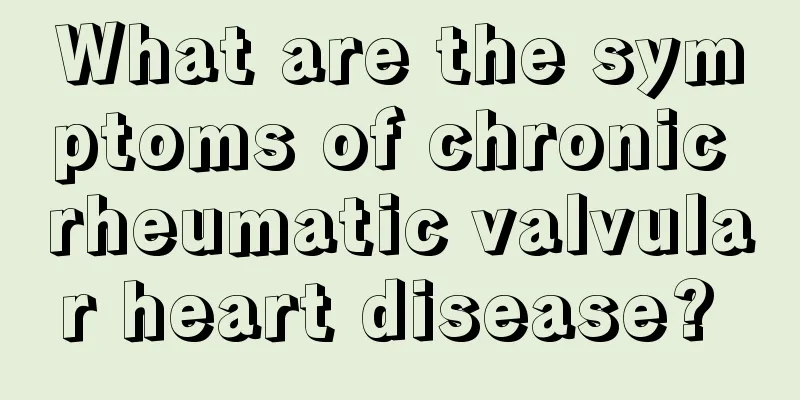What are the symptoms of chronic rheumatic valvular heart disease?

|
Heart disease is a general term for heart diseases, and chronic rheumatic valvular heart disease is also a type of heart disease. Rheumatic heart valvular disease is mainly related to rheumatism and is caused by invasion of the heart. The symptoms are relatively obvious and treatment must be timely. This is also a common disease. https://static.cndzys.com/20161114/01f19c824aee42892244cc230daabe3a.jpg 1. Mitral stenosis Mitral stenosis is often accompanied by varying degrees of insufficiency, but observations during surgical treatment have shown that the proportion of simple mitral stenosis is twice as high as that of mitral stenosis combined with insufficiency. Therefore, this type is the most common lesion in chronic rheumatic heart valve damage. 2. Mitral regurgitation is caused by the shortening, adhesion and deformation of the mitral valve leaflets, chordae tendineae, papillary muscles and other fibers due to degeneration, resulting in the valve not closing well. Patients with mild mitral regurgitation may have no subjective symptoms. More serious patients often experience fatigue, weakness, palpitations, and dyspnea after exertion, and sometimes symptoms of right heart failure. However, the number of patients suffering from acute pulmonary edema and hemoptysis is far less than that suffering from mitral stenosis. 3. Aortic valve insufficiency is caused by aortic valve inflammation and granulation tissue formation, which causes the valve to thicken, harden, shorten and deform, resulting in aortic valve insufficiency. Patients with mild symptoms often have no obvious symptoms. Severely ill patients may experience palpitations and a strong pulsating feeling in the arteries of various parts of the body, especially in the head and neck. About 5% of patients may experience angina pectoris. In the late stage, symptoms of left ventricular dysfunction and right ventricular dysfunction may appear. 4. Aortic valve stenosis is caused by adhesion and fusion at the junction of the aortic valve leaflets, and the valve gradually calcifies, resulting in aortic valve stenosis. It is currently believed that simple aortic stenosis is mostly caused by congenital or senile degenerative diseases, while rheumatic aortic stenosis is mostly accompanied by aortic valve insufficiency or mitral valve disease. Mild stenosis is usually asymptomatic. When the disease worsens, due to reduced cardiac output, there may be symptoms such as fatigue, dyspnea after activity, dizziness, fainting, and angina pectoris, and even sudden death (ventricular arrest or ventricular fibrillation). |
<<: How long can you live after a heart valve replacement?
>>: How to treat occlusive vasculitis
Recommend
Do river clams have parasites?
Speaking of river clams, we may think of river cl...
At what age do children grow all their teeth?
The growth and development of the baby is of great...
How to remove tea stains from stainless steel cups
In daily life, we all hope to have a sip of hot w...
Bowel cancer stool characteristics
Bowel cancer is a topic that sounds a little scar...
What is the reason for the numbness and swelling of hair
Sometimes people's scalp becomes numb due to ...
What is the reason for the bubbles in the utensil
The presence of foam in the urine is closely rela...
The dangers of running at night
People who like sports should often do one sport,...
Does the early survival rate of nasopharyngeal carcinoma have a high rate? How to prevent it?
Is the survival rate of early-stage nasopharyngea...
What are the common methods for treating fibroids
What are the common methods for treating fibroids...
What symptoms will appear when liver cancer spreads? What are the effects of liver cancer metastasis?
Liver cancer is a very common malignant tumor dis...
Is the bob haircut permed
Nowadays, people are more and more fond of beauty...
Does taking a bath lower blood pressure?
In this age of plenty, food and clothing are no l...
What are the effects of small green lemon
In fact, everyone should be familiar with lemon. ...
What's wrong with the calcification of the soft ribs in the chest
In today's social life, people's diets ar...
Nursing diagnosis method for esophageal cancer
The causes and treatments of esophageal cancer ar...









